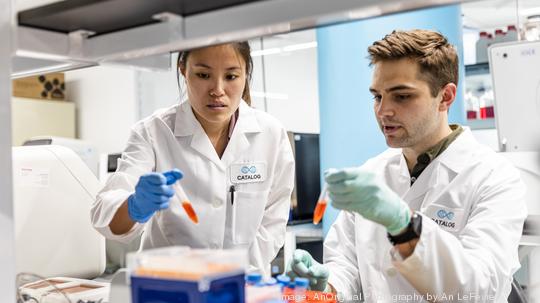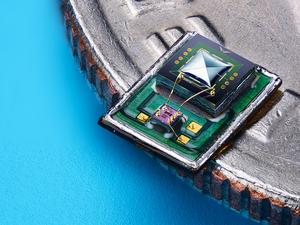
A Boston company working on storing digital data in synthetic DNA has attracted a new round of funding to help it work on its science fiction–esque vision of building chemical computers.
Catalog’s $35 million Series B fundraising is being led by Hanwha Impact Partners, a sustainability-focused investment wing of the South Korean conglomerate Hanwha Group.
The company was founded by MIT scientists in 2016 and has grown to 14 employees, including engineers, computer scientists, mathematicians, chemists and biologists. It’s looking to nearly double in size with the new round of funding.
Chief technology officer David Turek, who joined the company from IBM Corp., where he ran the company’s supercomputer business, said in an interview that Catalog has essentially created a machine using chemical processes that’s similar to the act of putting data on a tape drive.
The premise the company has put forward is that encoding or storing data in DNA instead of traditional hardware can reduce the amount of both volume and energy needed for that storage. And the persistent nature of DNA is valuable too, Turek said.
“If I create DNA and have a vial filled with DNA, I can have it last forever. I can preserve the DNA for 100 years, 1,000 years, 100,000 years. That’s important to some companies … they may have repositories of information which are hypercritical, that are always subject to destruction.”
But the company is also starting to look beyond simply storing data in this way to using its model for more complicated processing.
“We think we can employ the use of additional DNA molecules and other chemical probes to actually perform computation on this vial of information I can supply you,” Turek said.
The startup has a goal of commercializing its work in the next three years, and offering DNA computing as an online service, at first, with a physical device to follow.
“The investment money is going to be spent on going down the path of understanding which applications are most susceptible to these kinds of models, where does it create the most value,” said Turek.
Catalog has been working with companies who he said are “intrigued” by the technology, in sectors including media, oil and gas and high energy physics. The company also thinks its product could have government or military applications, and even space flight.
As far out as the company’s ideas sound, it’s a concept that’s been entering the mainstream in recent years. There’s a new trade group dedicated to DNA data storage, founded in part by Microsoft and including the Department of Energy’s Los Alamos National Laboratory.
See the company's description of its data-storage technology:








